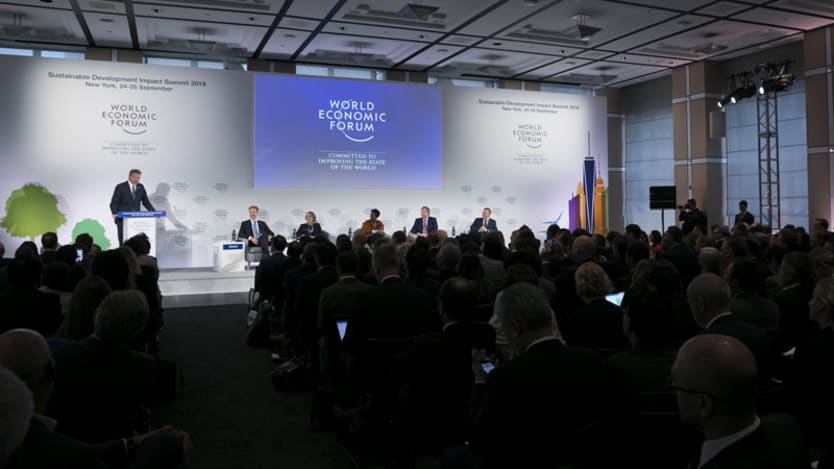
NEW YORK — The World Economic Forum’s annual event during Global Goals week tackled a host of big issues, but the key area of focus was how to accelerate the Sustainable Development Goals, with three strategies emerging from the discussions: Coalition building, systems thinking, and leveraging emerging technologies.
Coalition building
Funders gathered at the summit, including the Conrad N. Hilton Foundation CEO Peter Laugharn, stressed the needs for philanthropic efforts to work together and better coordinate in order to accelerate achievement of the SDGs.
"At a meeting like this, we're not talking so much about the what that foundations do together, because we'll be in different areas, but the how," he told Devex. "How do you take the strength that comes from having an endowment where you'll be around for 100 years, so 12 years to 2030 is nothing, with the short-term dynamism that you ought to have to be able to do things quicker than governments and others."
Foundations need to do more long-term thinking and need to partner more with others outside the sector, Laugharn said, adding that the summit was a unique forum for the kinds of conversations that can lead to coalitions.
That’s good news for WEF, which stated a goal at the summit of increasing the number of alliances from 100 to 1,000, said Dominic Waughray, head of WEF’s Center for Public Goods.
“We need coalitions to take on these challenges,” he said. “And you need someone to help do the plumbing, to figure out how are these commitments are going to turn into partnerships, and that is a sweet spot for us.”
Systems thinking
There are 17 SDGs but they amount to a unified agenda, and solving many of the challenges will mean taking into account varying parts of global systems, even if they may not seem related, rather than thinking about a particular issue independently.
“The SDGs call for a new way of thinking, of acting, of organizing, of communicating, of leading,” said David Nabarro, a former United Nations official and now strategic director of Skills, Systems & Synergies for Sustainable Development. 4SD is a new effort to mentor international development leaders with the skills they need, including systems thinking.
More on UNGA 2018:
► Guterres launches new plan for SDG financing, as private finance takes the spotlight
► UN warns of worsening famine in Yemen
► Q&A: A new, UN-backed global fund to support former child soldiers
“A more conventional approach to development is what we sometimes call a linear approach. We have a problem, we have a solution. And as long as we get that solution to everybody, we’ve solved the problem,” he said. “In systems thinking, rather than saying, ‘we’re going to change one particular part of one process,’ you’re thinking about the full range of processes, and recognizing if you’re not taking all of them into account, you’ll make some mistakes.”
Leveraging emerging technologies
The SDGs will require solutions of the future, including finding ways to capitalize on emerging technologies and harnessing their power in support of the goals. WEF works to provide a platform for innovators to partner to explore potential solutions, and that was true of this summit as well.
In a world where new technologies seem to emerge daily, one of the challenges is finding ways to rapidly apply new technology to solve problems. To that end, Hewlett Packard Enterprise is partnering with WEF on a new initiative, Tech Impact 2030, which is committed to helping solve world hunger through technology. It aims, with the help of additional partners, to tackle areas including financial inclusion, health care, and transportation.
“Our capacity to innovate is outpacing our ability to apply innovation to real problems,” Mark Potter, chief technology officer for Hewlett Packard Enterprise and director of Hewlett Packard Labs, told Devex.
NCDs. Climate change. Financing. Read more of Devex's coverage from the 73rd U.N. General Assembly here.








